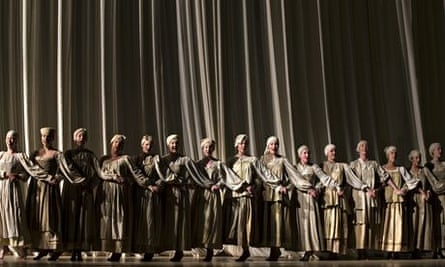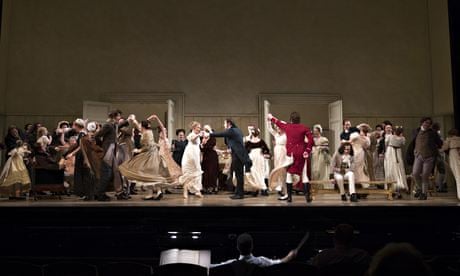First staged in 1994, Graham Vick's production has turned out to be a worthwhile investment. As it returns two decades on for yet another revival, with Vick back in charge, it still looks handsome. Richard Hudson's spare yet painterly sets define with precision not only the specific locations of each of Tchaikovsky's "lyrical scenes", but also their emotional atmospheres, while a clever use of sliding curtains reveals and then hides the action, presenting the polonaise at the St Petersburg ball, for instance, as a complicated sequence of social rehearsals and performances.
This time, a predominantly eastern European cast gives the score an authentic Slavic feel. The weak link, though, is the Tatyana of Ekaterina Scherbachenko, who seems overstretched in the role, especially in the crucial closing confrontation with Andrei Bondarenko as Onegin. Physically, however, she develops a deeply touching portrayal, while he transforms himself from a supercilious dandy at the beginning to the social outcast of the final scenes, where he's completely thrown by her sudden reappearance in his line of vision.

Vick's economical but acute direction maintains strong narrative values, creating its most detailed canvas for Tatyana's name-day celebrations, where every increase in the personal tensions that eventually destroy the event is faultlessly charted, especially by Edgaras Montvidas, who goes on to deliver an immaculately refined account of Lensky's elegiac aria in the duel scene. Secondary roles – Ekaterina Sergeeva's Olga, Diana Montague's Madame Larina, Irina Tchistjakova's Filipyevna and François Piolino's Triquet – are artfully sketched. Taras Shtonda, meanwhile, comes close to matching Montvidas' achievement in Lensky's aria with his noble version of Prince Gremin's.
Making his UK debut in the pit, Israeli conductor Omer Meir Wellber draws enthusiastic playing from the London Philharmonic in a beautifully fluent account of the score.

Comments (…)
Sign in or create your Guardian account to join the discussion